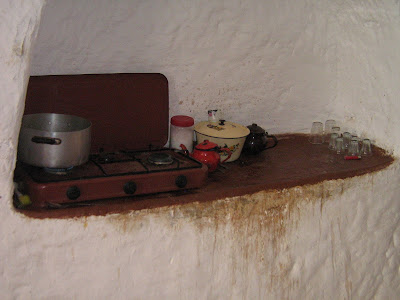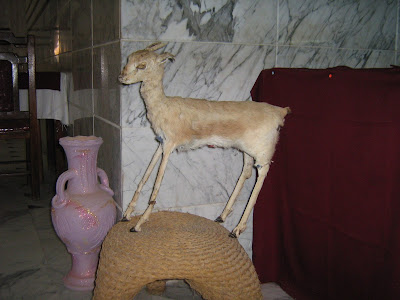~~
Star Wars Alert: Tatooine (Tataouine) is a real place.
It is a
province and a town in Tunisia.
Matmata is a small town at its north
end. ~~
 |
| Salt flats, northern Sahara |
The little Berber town of
Matmata has a lifestyle unto itself. Here be troglodytes. We have
driven east from Douz in a
beautiful amber light, sun obscured by the sand haze in the air. As
we pass away from desert and salt flats the terrain becomes hillier,
we begin to see man-made entrances to caves dotting the hillsides. Or
are
they caves? Most homes are like circular craters, dug into the
ground, the central portion open to the sky, with rooms carved out of
the surrounding sandstone. Light from the centre illuminates the
interiors that have no windows, just doorways.
On
the town outskirts our van stops at the side of the road and we are
about to find out what it's like to live underground. Only the
whitewashed exterior and a few pots mark the door. A long dark
entrance leads to the courtyard; we pass a man who's been having a
nap on a small bed along the narrow entry lined with some household
utensils and the odd bit of clothing.
Roadside
homes are often prepared to receive spontaneous passing visitors;
it's a way to supplement their meagre incomes. It's almost a cottage
industry, you might say, but the native hospitality has been eroded
by their exposure as (reluctant) objects of curiosity. Our guide Samy
gives us little advance information of what to expect, acting as the
cheerful host. I'm not at all sure he, being from a different, urban
part of the country, is even conscious of the dwellers'
sensitivities.
The
courtyard is sunny (it's still morning and the day is hot), deserted,
and shows half a dozen doorways. A pet called a gundi, of guinea-pig
resemblance, is in a cage. Oh ... a small girl about six or seven
years old peeks around a doorway that leads to a yard where an
outhouse can be seen. So this home is not a perfect crater. A family
member will undoubtedly be out somewhere tending the goat flock. We
gawk around, encouraged by Samy to investigate the rooms. It seems
quite intrusive; most of us feel diffident.
Several
rooms have beds arranged with colourful, patterned hangings and
blankets. The clothing hanging on wall pegs is spare. The kitchen has
something like a primus stove, some pans, and many clay pots for
storage. It's hot as hades in there as if someone was recently
cooking. Normally the temperature here would be cooler than up on
ground level.
The
little girl is now hanging out in the courtyard looking bored.
Suddenly, or so it seems, an elderly woman in black dress appears
seated in the courtyard.
Since
she looks posed, we take turns being photographed with her (still
feeling uncomfortable). Naturally she doesn't know any English and
seems disinclined to engage in talk. But our companion Alice strikes
a chord with her and they have some amiable exchanges. Instinctively
we give donations for taking the photos, only half-understanding that
it was expected.
Samy
directs us to the living room where a spread of pita, olive oil, and
mint tea has been set out for us. A typical breakfast for the family.
It was cooking the pita that likely sent the interior temperature
shooting up. The woman does not appear again, so we serve ourselves,
a sign (to me) that this must be a tiresome business for her. However
the little girl does join us, looking annoyed and slightly sullen; no
doubt her presence was ordered to add more atmosphere.
She
is sitting apart not far from me. My companion found the perfect
recipient for the bag of jujubes she'd carried all the way from
Canada. The kid's eyes light up and she actually smiles. Earlier we
were reminded that it was Remembrance Day. It is quite touching when
over this little feast, someone starts the poem "In Flanders
Field" and we all recite as best we can.
Onward
as lunch time approaches, into the town of Matmata. Here, an
obligatory visit to a small underground hotel, one of several in the
town, based on the circular pit concept. We peer at it from above; we
enter its courtyard from below for a different view. This hotel, Sidi
Driss, is billed (and immortalized) as "home to Luke Skywalker"
― yes, one of Tunisia's
many Star Wars locations. You too can sleep here. And so even
the dullest of us (not mentioning my name) finally gets the
long-lasting impact of filming in this area. We are not shown an
actual bedroom, but a group of tourists is having a fine time
lunching in the underground dining room off the courtyard.
Then
to a "regular" hotel for our lunch ―
Hotel Matmata is perhaps the only other hotel open in off-season ―
an old and interesting place needing attention to maintenance. The
cool, vast marble lobby is lovely. Lunch is a small but nice buffet
lacking, very oddly, any sweets; no complaints about apples and
oranges but not typical for desserts here. One has the sense
everywhere of cutting corners.
A
stuffed goat kid is part of the dining room decor. One of the
courtyards has molded clay depictions of a woman making pita bread, a
large camel with a broken tail. Despite its rundown condition the
place has much more charm than our occasional plush, generic hotels.
Star
Wars probably started a new tourist invasion in the 1980s and keen
fans still come to look. The location sets generally survive in good
order for visitors ―
others are west of here in Douz and near Tozeur. However, the latest
Star Wars movie (The Force Awakens) did not film here.[1]
Tourist boom time for this region may be over. Long known as a
smugglers' route, extremist
activities have been taking advantage of its relative isolation.
[1]
Conor McCormick-Cavanagh, "Tunisia's Star Wars Fans Battle to
Bring the Force Home," Middle East Eye
(http://www.middleeasteye.net/in-depth/features/tunisia-has-potential-establish-itself-star-wars-fan-paradise-599714959
: accessed 28 December 2015).
©
2016 Brenda Dougall Merriman
















No comments:
Post a Comment